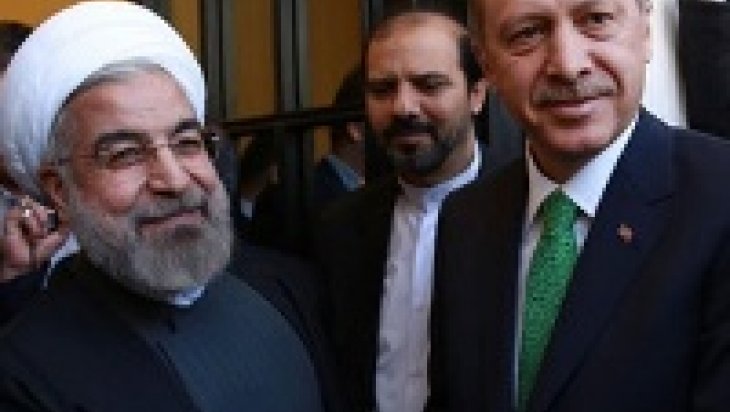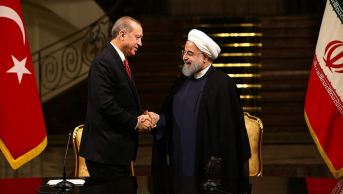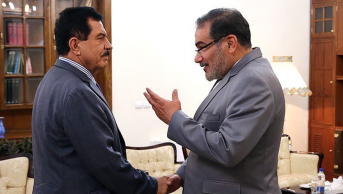Turkish PM Erdoğan's Visit to Tehran: A New Milestone in Relations Between Turkey and Iran

Turkish Prime Minister Recep Tayyip Erdoğan paid an official visit to Iran's capital Tehran on 28-29 January 2014. The visit is a new milestone to improve relations between Turkey and Iran which have been in turbulence for various reasons in recent years. In this study, transformation of the Turkey-Iran relations in the context of Erdoğan's visit to Tehran, and potential obstacles before the development of relations between the two countries are discussed.
A Milestone in Bilateral Relations: “High Level Cooperation Council”
During his Tehran visit, Turkish PM Erdoğan was accompanied by Turkish Foreign Minister Davutoglu, Energy Minister Taner Yildiz, and Economy Minister Nihat Zeybekci. Within the scope of the visit, Erdoğan met with First Vice President Ishaq Jahangir, President Rouhani, and Supreme Leader Ayatollah Ali Khamenei. During the talks, common concerns and expectations of both countries on regional issues, as well as the expectations on increasing the bilateral trade volume up to 30 billion dollars by the end of 2015, were expressed. Three agreements and a declaration (“A Cooperation Agreement to Form a Joint Trade Committee between Turkey and Iran”, “Preferential Trade Agreement [PTA]”, “A Cooperation Agreement Between Iran's Islamic Republic News Agency [IRNA] and Turkey's state-run Anadolu Agency [AA]”) were signed between the two countries.
The most significant result of the visit is that Turkey's Prime Minister Recep Tayyip Erdogan and Iran's President Hassan Rouhani signed “a joint political declaration on establishing a High Level Cooperation Council”. Despite the positive developments in relations between Turkey and Iran over the last decade, both countries had some reservations that kept them from furthering their bilateral cooperation. Therefore, High Level Cooperation Council agreement, one of the most important foreign policy tools of Turkey over the past decade, has been signed with many countries so far; but even the idea was never even brought forward to sign it with Iran until recently. Also, despite the fact that the Iranian government seemed so willing to initiate regional cooperation with Turkey, Turkish officials did not lean towards meeting the expectations of Iran.
There were two reasons underlying Turkey's prudent approach towards Iran: First reason was Iran's worsening relations with the U.S. and the West. While Iran was increasingly isolated from the international system due to both Iran's nuclear program, and also Ahmadinejad government's “radical foreign policy”, it was quite hard for Turkey to stand by this country at the expense of its traditional alliances. The second reason was Turkey's concerns regarding Iran's regional policies. Supporting the gradual “liberalization” and regional stability” of the region in economic and political terms, Turkey started to regard Iran's foreign policy towards countries such as Iraq, Syria and Lebanon in the region as a “destabilizing” factor; thus Turkey stayed away from Iran on regional issues.
Within this framework, the government change in Iran that took place on August 2013, and the new President Hassan Rouhani's adopting an approach that attaches importance to diplomacy and cooperation instead of conflict in foreign policy allayed Turkey's concerns on Iran. Turkey responded positively to Rouhani's taking concrete steps on nuclear issue with a reconciliatory approach, and Iran's giving priority to developing relations with countries in the region. These developments brought forward the proposal for establishing a “High Level Cooperation Council” between the two countries, which comes to mean that both countries aim at developing bilateral relations comprehensively.
Rationalization and Compartmentalization of the Relations between Ankara and Tehran
This positive development between Turkey and Iran does not mean that all bilateral problems are solved and disagreements especially on regional issues are eliminated. Despite the current problems and disagreements, this positive development on bilateral relations shows that Turkey-Iran relations have been “rationalized” and “compartmentalized”. The process of rationalization and compartmentalization in bilateral relations appeared in early the 2000s. Rationalization pushes controversial issues into the background and brings forward cooperation and common points between the two countries. Compartmentalization, on the other hand, means to tackle bilateral relations in terms of security, culture, economy, and regional relations separately. This dynamic prevents any negative development that emerges in an issue area in bilateral relations from spoiling other issues.
The past few years have been a significant test for rationalization and compartmentalization of the relations between Ankara and Tehran. Because, as it could be remembered, within the framework of the NATO Missile Shield Program in 2011, the fact that the U.S. radars were deployed within Turkish borders, Patriot missile systems were installed on Turkey-Syria border, and Turkey and Iran opposed to one another over the developments both in Iraq and Syria severely threatened the ties between Ankara and Tehran. Interestingly enough, the trade volume between Turkey and Iran almost reached 22 billion dollars in 2012 with a new record during that period when the relations between Ankara and Tehran were severely threatened. This achievement shows that these two countries could actually cooperate by putting controversial issues aside.
Potential Obstacles before the Relations between Turkey and Iran
In the coming months, Iran's President Rouhani is expected to pay an official visit to Turkey. It is likely that new agreements will be signed during that visit. On the other hand, despite the rationalization and compartmentalization in bilateral relations, there are still certain potential obstacles before the improvement of bilateral relations.
Above all, it is worth recalling that during the mutual high-level visits between Turkey and Iran, customarily messages of goodwill and cooperation are delivered, some agreements are signed; but certain problems appear in putting these agreements into practice. These could be bureaucratic or technical problems, but the main problem stems from the fact that the political will does not follow the agreement. There are many agreements signed between Ankara and Tehran which could not be put into practice because of certain problems. For instance, the energy cooperation deal envisaging Turkey's prospecting, drilling, processing and marketing natural gas in Iran in 2007 was shelved after staying on agenda for a long time. Also, the “preferential trade agreement” which was signed during PM Erdoğan's visit was on the agenda for years. As a matter of fact, the aforesaid agreement which was expected to be signed during Turkish President Abdullah Gül's visit to Tehran in 2011 has just been signed.
It could be suggested that another potential obstacle before the bilateral relations is the potential weakening of Rouhani government's power. As mentioned above, the new approach Rouhani adopted in Iran's foreign policy eliminated Turkey's reservations towards Iran. Turkey's positive approach towards Iran during this period could also be assessed as a step to support and encourage Rouhani's government. However, taking into account the balance of power between political groups in Iran, Rouhani government's political future and capacity considerably depends on its performance and success on solving Iran's nuclear issue. Rouhani's failure on this issue could lead to change of balance in Iranian politics. Along the lines of this prospect, new developments that could take place in Iranian politics and foreign policy might present additional challenges for the relations between Turkey and Iran as well.









